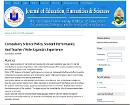| dc.contributor.author | Joyce, Ayikoru Asiimwe | |
| dc.date.accessioned | 2023-11-06T09:29:56Z | |
| dc.date.available | 2023-11-06T09:29:56Z | |
| dc.date.issued | 2014 | |
| dc.identifier.citation | Asiimwe, J. A. (2014). Compulsory Science Policy, Student Performance, And Teachers’ Role: Uganda’s Experience. Journal of Education, Humanities and Sciences (JEHS), 3(1 & 2). | en_US |
| dc.identifier.uri | https://hdl.handle.net/20.500.12504/1500 | |
| dc.description.abstract | Using Lipsky’s concept of the street-level bureaucrat, this paper highlights how teachers may be contributing to students’ high failure rates within the framework of the recent educational reforms, with particular focus on the Compulsory Science
Policy (CSP). Analysis of students’ performance in science and mathematics before and after the policy indicates that secondary schools have continued to register high student failure rates in mathematics and the core sciences. This dismal performance
puts science teachers on the spotlight and threatens to undermine their professional competence. Over the years science teachers have often responded to the dilemma of high failure rates by locating the problem within the schools, students, and students’ home environment. Teachers rarely think of themselves as part of the problem. The paper argues that to realize the critical human resource base required to drive the
country into the direction of achieving its national goals, there is need for teachers to identify themselves with student failures and become accountable for the teaching and learning outcomes in secondary schools. | en_US |
| dc.language.iso | en | en_US |
| dc.publisher | Journal of Education, Humanities and Sciences (JEHS) | en_US |
| dc.subject | Science education policy | en_US |
| dc.subject | Accountability | en_US |
| dc.subject | Learning outcomes | en_US |
| dc.title | Compulsory science policy, student performance, and teachers’ role: Uganda’s experience | en_US |
| dc.type | Article | en_US |

